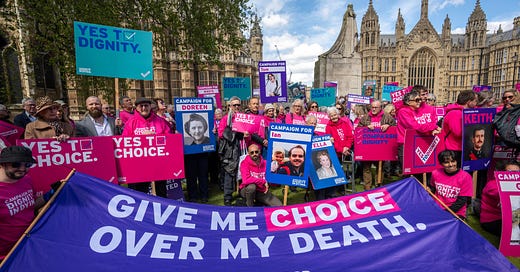“Be less fearful!”: the religious leaders supporting assisted dying
Religious faith and a favourable attitude towards Leadbeater's bill on legalising assisted dying are not mutually exclusive.
For Reverend Rosie Harper, of dual Swiss and British nationality, faith and assisted dying are not mutually exclusive.
Her uncle, who lived in Zurich, chose an assisted death after discussing it in detail with his family, avoiding a “truly horrible” end that would have ensued otherwise. He died surrounded by his family and a wife who was “grateful to live in a civilised country where this has been possible.”
Assisted dying has been legal in Switzerland since 1941, and nearly 350 British people have travelled to Dignitas, a Swiss organisation providing assisted dying, to end their lives so far, according to the pro-assisted dying organisation, Dignity in Dying.
Reverend Harper’s family experience helped her to reconcile assisted dying to her religious beliefs. She is now part of the Religious Alliance for Dignity in Dying, a group which defies the preconception that all people of faith are opposed to assisted dying and supports the notion of a compassionate non-interventionist God.
Next week, the House of Commons will vote on Labour MP Kim Leadbeater’s private member’s bill to legalise assisted dying in Britain.
Currently, assisted dying is illegal in the UK and those assisting a death can be punished with up to 14 years in jail. Family or friends who travel to Dignitas with a loved one and are present during the process can also be prosecuted upon returning to the UK.
In the hotly contested debate generated by Leadbeater’s bill, concerns about the poor state of palliative care in the UK and weak safeguarding measures for assisted dying have clashed with appeals on the principle of personal choice, compassion and even public opinion, which is overwhelmingly in favour of changing the law.
In this matter of life and death, Rabbi Dr Jonathan Romain MBE is another religious figure who has come down on the same side as Reverend Harper. While chair of Religious Alliance for Dignity in Dying, he has not always been in favour of assisted dying: earlier on his life, he felt “automatically” opposed to it. But his mind was changed after visiting many hospitals and hospices, and bearing witness to one particularly harrowing incident of an individual dying in violent pain. Far from going against his religion, it is precisely because of his faith that he believes “people who wish to have a good death should be able to do so.”
Rabbi Romain founded the alliance to show that “there is diversity within faithful people,” having declared last year that religious leaders who oppose assisted dying are “out of step with flocks.” In a poll commissioned by Dignity in Dying in February of this year, 75% of respondents said they would support legalising assisted dying in the UK, as well as 66% of people of faith and 69% of Christians.
He told Reaction that the current system in Oregon, where assisted dying is legal only for mentally competent adults with a terminal illness that will lead to death within six months, is what Dignity in Dying is hoping to see implemented in the UK.
Reverend Harper and Rabbi Romain both acknowledged the concerns that have gathered attention ahead of the vote on Leadbeater’s bill. For instance, anti-assisted dying group Right to Life UK warned that 46% of people who died via assisted suicide in 2022 in Oregon said being a “burden on family, friends and caregivers” was one of their “end-of-life” concerns.
Yet Rabbi Romain argues that “the life force is such that people would not let go of life unless they are in great pain. If it also happens that they feel they are a burden then that is not the key reason.”
The Catholic Bishops’ Conference of England and Wales opposes assisted dying, which it says is based on “flawed ideas of autonomy”. The religious committee argues that suffering is part of being human, and that proponents of the bill “ultimately pass judgement on the value of human life according to its abilities rather than its inherent value.” Instead, it says that the emphasis should be placed on greater investment in palliative care.
In recent weeks, Health Secretary Wes Streeting stirred conversation by putting forward a similar argument, announcing he will vote against the bill, because palliative care is not good enough to offer people in this country a genuine choice. Rabbi Romain admits he was “very disappointed” by the announcement. While improving the quality of end-of-life care offered in the country is incredibly important, he does not think Streeting put forward a good argument for closing down other options. Reverend Harper agrees: “One bad does not mean you have to create another bad.”
Rabbi Romain is aware too of concerns that six-month forecasts on how long an individual has left to live are not always accurate, and that sometimes terminally ill individuals far outlive doctors’ predictions.
But he is sceptical that an inaccurate forecast in itself would lead individuals to prematurely choose to end their lives. Why? Because terminally ill individuals, who are not in pain, will almost certainly want to enjoy their life for as long as possible. “Most people want to live until the last possible breath”, says Rabbi Romain. “But it is quite obvious when your body is closing down and you can’t move or swallow.”
Reverend Harper urges Britain to “be less fearful!” This change in law, she insists,“is something that a vast majority of people in the UK would like to happen and it would make our country that bit more compassionate and civilised.”




